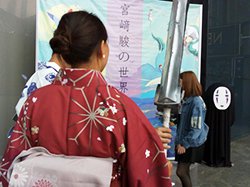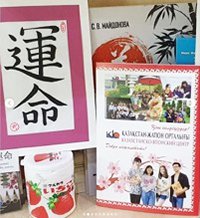For Learners of the Japanese Language in Kazakhstan
The Kazakhstan-Japan Center for Human Development, Nur-Sultan
SAITO Satoko
1. The Primary Operations of the Nur-Sultan Office
The headquarters of the Kazakhstan-Japan Center for Human Development (hereinafter “KJC”) are located in the southern city of Almaty, the former capital of Kazakhstan. Meanwhile, the Nur-Sultan Office is located in a classroom of the Kazakh Humanitarian Law University, commonly known as KAZGUU in the current capital of Nur-Sultan. We also use two classrooms of the National Academic Library of the Republic of Kazakhstan to teach classes on Saturdays.
The main work of the Office is to teach two Japanese-language courses per year for the “Marugoto: Japanese Language and Culture” (hereinafter “Marugoto”) course in Spring and Fall, and our current challenges are to consult with other teachers to find ways for learners to continue their studies because of the yearly decline as they go to a higher level, and to run the classes in a way easy for working adults to participate.
2. Progress in Developing Teaching Material for Japanese-language Learners
“Hiragana Association”
The idea for a teaching materials package called “Hiragana Association” came out of a workshop for Japanese-language teachers held in Almaty in July 2019. Subsequently, Murzagulov Aktoty and Abeuov Dinara, full time and part time teachers respectively at KJC Almaty, completed the illustrations for the materials. The materials associate each Hiragana character with a Russian word to allow learners to easily memorize the characters through pictures. We plan to use these materials in the “Online Reading Course” that will start in June 2020. Take a look at the KJC facebaook and Instagram account.
Teaching Materials for Online Classes
Due to the spread of the Covid-19 Pandemic, educational institutions were closed in Kazakhstan as well in March 2020, making face to face classes impossible, so we began preparing for online classes. Full time teachers at the KJC Almaty and Nur-Sultan offices cooperated to create online teaching materials by pasting pages and voice recordings from the Marugoto course into PowerPoint slides and creating animations for the answers. We also chose to use WhatsApp, a social media app, for contacting the students through groups created for each class, and used Zoom in the classroom. We also plan to use these materials for the summer reading course, the intensive course, and the fall course.
Our next step will be to create online teaching materials for other courses to support the Marugoto course, including a Kanji course and grammar course.
3. Participation and Cooperation in Events to Know About Japanese Culture
2019
June
Every year on International Olympic Day, a promotional event for the Olympic movement is co-hosted by the Kazakhstan National Olympic Committee (NOC) and the Fitness Park Astana (a project of the Nur-Sultan city hall). With cooperation from the Embassy’s Japan Information and Culture Center, the Nur-Sultan Office ran a Yukata wearing workshop and a Shodo calligraphy booth at the event in 2019. The Yukata were a big hit.
July
We hosted a boot at an event called “Hanabi Fest by AniMarket” where 11 volunteer students of the courses at the Nur-Sultan Office ran Go games, Shodo calligraphy and Origami workshops, mini Japanese-language courses, and “Algorithm Taiso” sessions. The venue was filled with young men and women showing off their cosplay.

Students in Kimonos at the Hanabi Fest by AniMarket
September
A Shodo calligraphy workshop was held at a mall in the city. We had participants create frames out of thick colored paper to hold calligraphy works written on sheets one-quarter the size of the Hanshi calligraphy paper size so they could be put on display.

The Shodo workshop at the mall
October,
We assisted in an event held by “Ambassadors Spouses Astana (ASA),” a volunteer group of the spouses of Ambassadors in Astana, to auction off Japanese Kimonos for charity. We set and worked with two booths at the event: one to teach how to wear Yukata, and another to write the names of Kazakh attendees in Kanji.
October
We held an Origami workshop at the request of the art school located within the secondary educational institution, School No. 18. The participants learned to make cranes out of colored paper.
2020
March
We visited the Nazarbayev Intellectual School (hereinafter “NIS”) and the Karaganda University Bolashak in the city of Karaganda to hold workshops including a quiz on Japan, Origami, and Chiyogami paper dolls. There were 40 participants at each.
4. Activities for Japanese-Language Education
2019
September
We lent the Marugoto textbook to the Japanese- language course at NIS in Nur-Sultan.
October Exchange Student Fair
Three Japanese educational institutions, including Hiroshima University, University of Tsukuba, and the Japan Student Services Organization (JASSO), set up a booth to give explanations of their organizations and take questions. Abeuov Dinara of the Nur-Sultan office supported them by giving a presentation. There were 150 visitors to the booth.
December 1
The Japanese-Language Proficiency Test (hereinafter “JLPT”) was held successfully at the Kazakh Humanitarian Law University (KAZGUU) with 65 test takers.5. Japanese-Language Teacher Training
2019年
July 8 and 9
The 7th Marugoto Seminar was held in Almaty. The theme of the seminar was on proposing classes developed with learner participation. There were 26 participants at the seminar.
October
Teacher training was held for four Japanese-language teachers. The participants learned about answering and explaining using the N2 level materials for the JLPT, with a focus on reading comprehension.
December 2019 through January 2020
Training was held for the two new part time teachers at the Nur-Sultan Office, including the basic concepts of Marugoto, the JF Standard for Japanese-Language Education, how to use teaching materials, class observations, and demonstration classes.
Future Challenges
A study session needs to be held for teachers on how to carry out online classes effectively. I hope to share what the challenges there are and how to overcome them to improve the classes.
Furthermore, given that we can no longer host events to which people gather due to the ongoing Covid-19 Pandemic, everyone at KJC must work on how we can continue to provide opportunities to interact with Japanese culture.
- What We Do Top
- Arts and Cultural Exchange [Culture]
- Japanese-Language Education Overseas [Language]
- Japanese-Language Education Overseas [Language] Top
- Learn Japanese-language
- Teach Japanese-language
- Take Japanese-Language Test
- Know about Japanese-language education abroad
- The Japanese-Language Institute, Urawa
- The Japanese-Language Institute, Kansai
- Japanese-Language Programs for Foreign Specified Skilled Worker Candidates
- Japanese Language Education for Japanese Children Resident Overseas and for the Descendants of Migrants
- Archives
- Japanese Studies and Global Partnerships [Dialogue]
- JF digital collection
- Other Programs / Programs to Commemorate Exchange Year
- Awards and Prizes
- Publications
